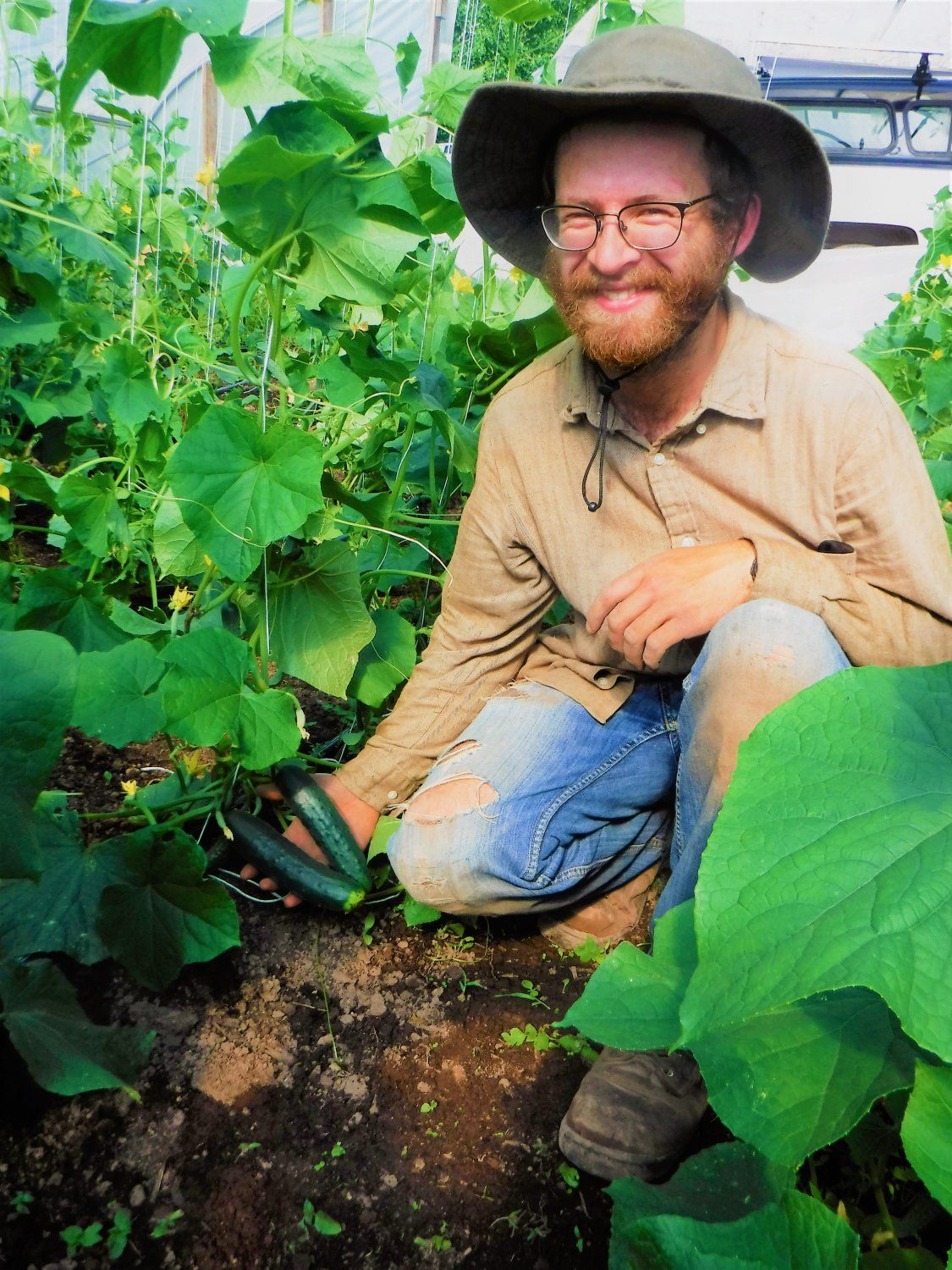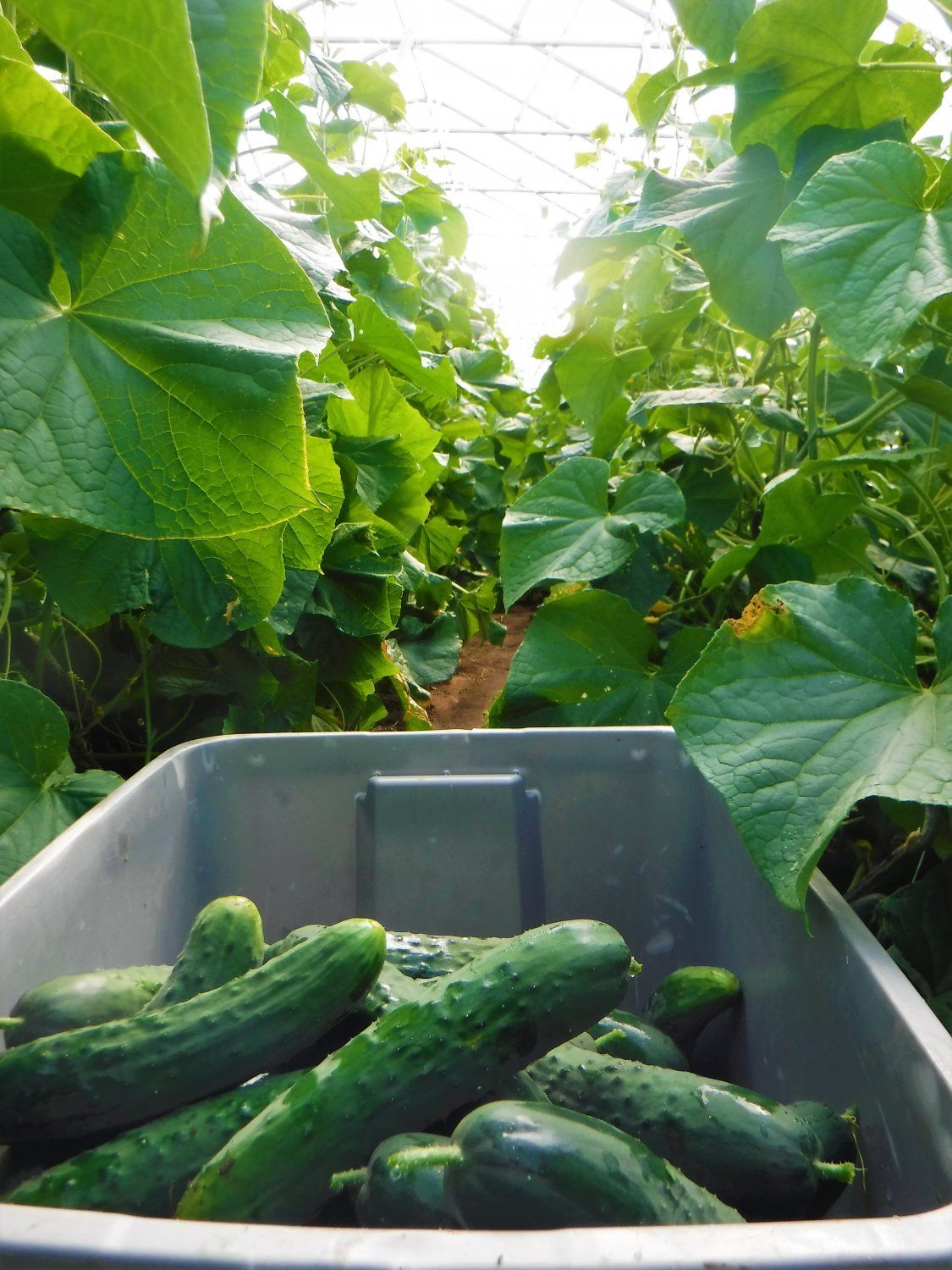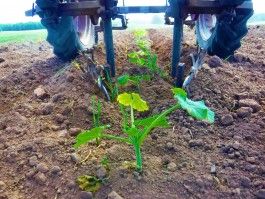Whew, what a cooker of a week! It was about 90 degrees here every day this week. On the farm, that heat means the end of spinach - last week was the final spinach harvest from our farm until later this fall when we begin to harvest late summer planted beds of spinach. See you in a few months, old friend. However, we'd like to give a very warm welcome to the first cucumber harvest of the season! We will have cukes steady now until the cold weather of fall begins to set in.
We've been catching up on many different projects here at Great Oak Farm. Earlier this week I was able to replace the busted parts of the front wheel on the field tractor, and need to give a big shout out to fellow Bayfield Foods farmer Tom Cogger of Maple Hill Farm for letting me use the bearing press in his shop to get the wheel ready to mount again. Sometimes we can get by doing repairs without the "proper" tools, but pressing big bearing races to set them correctly on a real press is mighty nice. Tom has been my mechanic mentor for a while now, and he sure is a great guy to work with. Farmers helping farmers - that's my style.
Once the tractor was back up and running, we had thousands of transplants to get in the ground. Farmers Alex, Sean, and Ryan finished putting the last of the winter squash in the field, and then moved on to another round of cabbage, broccoli, and cauliflower transplants. Meanwhile, I got to work cultivating our first plantings of squash, carrots, sweet corn, and green beans with our little old Farmall Cub.
Despite the lack of any rain for a while now, the weeds are still managing to grow. You can see lots of little weeds coming up in the picture below in front of the little red Cub. With this dry weather, any cultivating will really set them back - take that, ya weeds!
Most organic growers use black plastic to control weeds in their vine crops like squash, but not us. We just can't bear to throw out dumpsters of used plastic every fall - that's not our idea of what organic farming means - so we keep the weeds back with our old cultivating tractors. They do a pretty good job - check out those tidy rows of winter squash below. Once we get a new starter switch for our other cultivating tractor (machinery maintenance... it never ends!) we'll clean up the weeds growing directly IN the rows of squash with a different tool called a finger weeder. Hopefully I can show you some pics of that little gem working next week.
Here's the view from the tractor seat as we go speeding down the rows:
.JPG)
It'll sure get your adrenaline going, racing up and down the rows of veggies with some steel cultivators beneath you digging in weeds by the thousands. Go Cubby GO!
Here's one more pic of the little Cub - all of 10 horsepower. Basically, it's a go cart with cultivators. It's a 1947-48 model, and every time we use it my heart smiles. I love seeing those old tractors still being useful after all these years. I bet you never would have guessed I have a soft spot for old tractors, huh? ;)
The other big project this week was mowing several acres of really impressive cover crops seeded late last summer. The stands of winter rye, as well as stands of mixed winter rye and vetch (a legume that can fix nitrogen from the air into the soil through bacteria that colonize it's roots) were so thick and dense our mower could hardly take them down - some fields needed to be mowed again to knock it all back. Big rye and vetch crops create an incredible amount of organic matter, and that's just what soil needs to stay healthy and productive.
These crops - cover crops, or green manure crops as they are sometimes called - are so important for biological, organic farming. Here at Great Oak Farm, we spend thousands of dollars and over a hundred labor hours each year to incorporate them into our farm systems, but building up our soil is an investment every organic farmer makes in the land. Healthy soil = healthy crops = healthy food = healthy people = healthy communities. Regenerative agriculture means staying focused on the long haul, not just year by year crop yields.
In fact, the Rodale Institute in PA as done side-by-side trials of organic vs conventional yield data for over 30 years, and they have shown that organic systems which include cover cropping to build soil organic matter are actually MORE productive (and more resilient to weather related stresses) than synthetic, conventional approaches to crop production over time. Pretty cool stuff.
Here you can see some winter rye that is as high as the fenders on the tractor !
Another great benefit of these cover crops is the habitat they provide for pollinators. We let the crops grow as long as possible before mowing them down to maximize their ecological contribution. All day long, those fields are buzzing with big bumble bees, nimble orange/black monarch and yellow/black swallowtail butterflies, and loads of other bugs and critters I can't even identify. The monarchs in particular seem to love having nectar from the purple vetch flowers so early in the season, before the milkweeds bloom.
As I was mowing, a lady bug landed on my arm (lady bugs are a predator species to many problematic insects on a veggie farm). Free pest control - thanks, little lady bug! It's just one of the many benefits of cover cropping.
Finally, here's a recipe from Farmer Brian at Northcroft Farm for a tasty side dish you can make with some of the products from your veggie boxes this week.
Beet/sheep cheese Bruchetta
1 24 Crostini
2 ½ cup beets
3 4-6 oz Ewe Rascal Cheese
4 Tablespoon balsamic vinegar
5 10 basil leaves cut into ribbons
6 1/8 C finely diced red onion or shallot
7 Dash pepper
8 1 ½ tablespoon olive oil
9 1/2 teaspoon sugar
1. Remove Ewe Rascal cheese from refrigerator about 1 hour before hand to allow cheese to warm to room temperature.
2. In a medium put, cover halved beets with water and boil until just tender, about 20-30 minutes. When beets are fork-tender, drain pot, refill with cold water and slip skins off the cooked beets under running cold water using your hands. Dice into very small tiny cubes and place in a bowl.
3. Add finely chopped onion, salt, pepper sugar olive oil and balsamic vinegar stir to combine. Taste and adjust as desired.
4. Spread a little Ewe Rascal cheese on the top of the crostini, leave a little indentation in the cheese. Fill the indentation with a Tablespoon of beet mixture. Garnish with a few basil ribbons.
Well, that's it from the farm this week. Have a great weekend, be well, and stay cool!
In community,
Farmer Chris (deep in a field of rye)
Great Oak Farm

.JPG)
.JPG)
.JPG)
.JPG)
.JPG)
.JPG)



